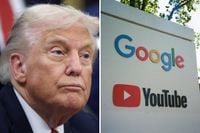In a dramatic and politically charged showdown, the nation’s top Spanish-language broadcaster, Univision, has vanished from YouTube TV, sparking a fierce debate that’s reverberating across the media, political, and Hispanic communities. The dispute, which erupted after contract negotiations between TelevisaUnivision and Google-owned YouTube TV broke down at the end of September 2025, has left millions of viewers scrambling for alternatives—and drawn in none other than former President Donald Trump.
On October 4, 2025, Trump took to his Truth Social platform, urging Google to restore Univision’s access on YouTube TV. "I hope Univision, a great and very popular Hispanic Network, can get BACK onto the very amazing Google/YouTube," he wrote, adding, "It has been taken out of their package, which is VERY BAD for Republicans in the upcoming Midterms." Trump’s post wasn’t just a call for media fairness—it was a nod to the crucial role Univision played in his 2024 campaign, when the network hosted a high-profile town hall in Miami just weeks before his election victory.
Trump’s relationship with Univision has always been complicated. While he praised the network for its "highest rated ever political Special" and claimed to have set a Republican record in Hispanic voting—citing Pew Research Center data showing he received 48% of the Hispanic vote in 2024, surpassing George W. Bush’s 44% in 2004—his history with the broadcaster includes a notorious 2015 press conference incident. Back then, Trump refused to take a question from Univision journalist Jorge Ramos, telling him to "go back to Univision" before security escorted Ramos out. Ramos later called it "an attack on the freedom of the press in the United States."
Despite past tensions, TelevisaUnivision’s current leadership welcomed Trump’s recent advocacy. CEO Daniel Alegre posted on social media, "Thank you very much President Trump for recognizing the impact of Univision and the importance of Hispanics. We take pride in Univision representing the voice of Hispanic America. It is our priority to bring Univision back to YouTube TV."
The timing of this carriage dispute couldn’t be more sensitive. It coincided with Hispanic Heritage Month and unfolded as a potential government shutdown loomed, leaving many Hispanic households without access to Spanish-language news, entertainment, and crucial public affairs programming. TelevisaUnivision lambasted Google’s move as "tone-deaf and egregious," especially given the appeals from government officials and Hispanic organizations to keep Univision on the main bundle. "To add insult to injury, YouTube TV chose to take this step during Hispanic Heritage Month – an act that is deeply insensitive and offensive," the company stated.
For its part, YouTube TV has been adamant that the dispute is strictly business. In a statement to The Hill, a YouTube spokesperson explained, "TelevisaUnivision has over 160 million subscribers and billions of views across YouTube, where they generate ad revenue from their content. On our paid live TV subscription service, YouTube TV, however, TelevisaUnivision only represents a tiny fraction of overall consumption." The company argued that TelevisaUnivision’s demands for higher distribution fees were not justified by viewership data over the last four years. "We remain open to negotiating an agreement that reflects their performance on YouTube TV. Until then, their content remains unavailable on YouTube TV."
The standoff isn’t just about money—it’s about visibility and access. TelevisaUnivision warned viewers in September that its channels might be relegated to a Spanish-only add-on package, hiking costs for Latino households already paying $82.99 a month for YouTube TV. The company likened the move to a "Hispanic tax" and launched a national ad campaign urging Google to "do the right thing." In an open letter, CEO Daniel Alegre wrote, "Stripping access to Univision at such a critical time shows a blatant disregard for the communities we serve. We call on Google to respect its Hispanic subscribers and keep Univision within its core programming bundle."
Hispanic media advocates have characterized Google’s removal of Univision as not just a business decision, but a political and cultural slight. Some have even suggested the network was being punished for hosting Trump’s 2024 town hall, when other broadcasters wouldn’t. TelevisaUnivision, meanwhile, has pointed out that the blackout disproportionately affects millions of Spanish-speaking Americans who rely on their programming for news, sports, and entertainment.
While the impasse with YouTube TV has dominated headlines, TelevisaUnivision has scrambled to reassure viewers that alternatives exist. Select programming remains available on the Univision Noticias YouTube channel and on ViX, TelevisaUnivision’s own streaming platform. The company has also highlighted distribution agreements with other major platforms: its channels are available on DirecTV’s "MiEspañol" package (which costs $35 per month and includes access to the ad-supported version of ViX) and on Hulu with Live TV, thanks to a robust partnership with the Walt Disney Company.
This isn’t TelevisaUnivision’s first streaming setback in 2025. Earlier in the year, Fubo also dropped the company’s channels after their own agreement expired. The trend has raised alarms among Hispanic media advocates, who worry about a growing digital divide in access to culturally relevant content.
Meanwhile, YouTube TV has managed to secure other major carriage deals. Just days before the TelevisaUnivision blackout, the platform inked a long-term agreement with NBCUniversal, averting a potential blackout of NBCU networks in more than 10 million homes. The contrast hasn’t gone unnoticed by TelevisaUnivision, which argues that Google is prioritizing other media conglomerates while sidelining Spanish-language audiences.
In the background, the political stakes are high. Trump’s intervention underscores how vital Spanish-language media—and Univision in particular—has become as both parties court Hispanic voters ahead of the 2026 midterms. Trump’s own campaign benefited from Univision’s reach, and he’s not shy about saying so. "They were so good to me with their highest rated ever political Special, and I set a Republican Record in Hispanic voting," Trump wrote. For Republicans, the loss of Univision on a major platform like YouTube TV is more than just a media blackout—it’s a strategic setback.
As the dispute drags on, both sides insist they’re open to further negotiations. "Google has made an unfortunate mistake that is easily reversible, and we are always open to finding constructive ways for Hispanics to regain access to their trusted and critical content," TelevisaUnivision said in a recent statement. YouTube TV, too, says the door is open—provided the terms reflect actual viewership and value.
For now, millions of Spanish-speaking households are left in the lurch, forced to navigate a patchwork of streaming options or pay extra for content that was once included in their basic subscription. The battle over Univision’s future on YouTube TV is far from over, but one thing is clear: the intersection of business, politics, and culture has rarely felt so personal—or so public.


